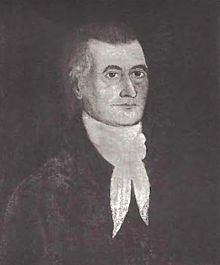Jonathan Hunt (Vermont lieutenant governor)
| Jonathan Hunt | |
|---|---|

Hunt as depicted in Volume V (1891) of the "Vermont Historical Gazetteer".
|
|
| 1st Lieutenant Governor of Vermont | |
|
In office 1794–1796 |
|
| Governor | Thomas Chittenden |
| Preceded by | Peter Olcott |
| Succeeded by | Paul Brigham |
| Personal details | |
| Born |
September 12, 1738 Northfield, Massachusetts |
| Died | June 1, 1823 (aged 84) Vernon, Vermont |
| Resting place | North Vernon Cemetery, North Vernon, Vermont |
| Citizenship | US |
| Spouse(s) | Lavinia (Swan) Hunt |
| Relations |
John Webster Benjamin Swan Timothy Swan Lewis R. Morris |
| Children | Ellen Francis Hunt Anne Hunt Lavina S. Hunt Jonathan Hunt |
| Parents | Samuel Strong Hunt Ann (Ellsworth) Hunt |
| Residence | Vernon, Vermont |
| Profession |
Landowner Politician |
Jonathan Hunt (September 12, 1738 – June 1, 1823) was an American pioneer, landowner and politician from Vernon, Vermont. He served as Lieutenant Governor of Vermont and was a member of the prominent Hunt family of Vermont.
Hunt was born in Northfield, Massachusetts, the son of Captain Samuel Strong Hunt of Northampton and Ann (Ellsworth) Hunt of Windsor, Connecticut. He was one of the earliest settlers of Vermont, and he began clearing land at Guilford, Vermont in 1758.
There are indications that the Hunt family had ties to Vermont even earlier, when Hunt's grandfather Jonathan witnessed a 1687 Massachusetts deed conferring land in what was later Vermont by several Native Americans. Hunt's father, Captain Samuel, had himself been the proprietor named in the charter of many New Hampshire towns.
Hunt and his associates were granted extensive tracts of land by New Hampshire Governor Benning Wentworth, as well as by patent from New York State and by purchase.
Hunt held various political positions in Vermont, and served as sheriff of Windham County in 1781. He was high sheriff in 1782, and judge of the Windham County Court in 1783. He served as Lieutenant Governor of the state of Vermont from 1794 to 1796. In 1800 Hunt served as one of Vermont's presidential electors; Vermont was carried by the Federalists, and Hunt cast his ballots for Federalist candidates John Adams and Charles Cotesworth Pinckney.
Hunt is considered one of the founders of Vermont as well as one of its earliest pioneers and largest landowners. He lived in Vernon, Vermont, the name suggested by his wife Lavinia (Swan) Hunt, a Massachusetts native and former pupil of President John Adams.
...
Wikipedia
